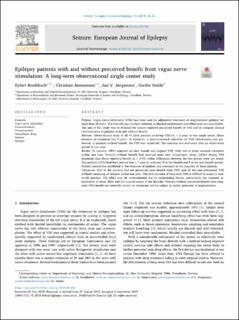| dc.contributor.author | Brodtkorb, Eylert | |
| dc.contributor.author | Samsonsen, Christian | |
| dc.contributor.author | Jørgensen, Jan V. | |
| dc.contributor.author | Helde, Grethe | |
| dc.date.accessioned | 2021-07-08T09:20:48Z | |
| dc.date.available | 2021-07-08T09:20:48Z | |
| dc.date.created | 2019-10-28T15:16:22Z | |
| dc.date.issued | 2019 | |
| dc.identifier.citation | Seizure. 2019, 72, 28-32. | en_US |
| dc.identifier.issn | 1059-1311 | |
| dc.identifier.uri | https://hdl.handle.net/11250/2763896 | |
| dc.description.abstract | Purpose: Vagus nerve stimulaton (VNS) has been used for adjunctive treatment of drug-resistant epilepsy for more than 25 years. The true efficacy has been debated, as blinded randomized controlled trials are unavailable. The aim of this study was to evaluate the patient-reported perceived benefit of VNS and to compare clinical characteristics of patients with and without benefit. Methods: Observational study of all 43 adult patients receiving VNS for > 2 years at one single center. Mean duration of treatment was 9 years. At inclusion, a semi-structured interview on VNS effectiveness was performed. In patients without benefit, the VNS was turned off. The outcome was evaluated after an observation period of one year. Results: 21 patients (49%) reported no clear benefit and stopped VNS. Only one of them resumed treatment within one year. Patients without benefit had received more new antiepileptic drugs (AEDs) during VNS treatment than those reporting benefit (p = 0.05). Other differences between the two groups were not found. Ten patients (23%) had been seizure free > 1 year at inclusion (5 in the benefit and 5 in the non-benefit group). Seizure control was attributed to the response of another new treatment in the majority of these patients. Conclusion: Half of the patients had not perceived clear benefit from VNS, and all but one terminated VNS without worsening of seizures within one year. The true outcome of long-term VNS is difficult to assess in realworld practice. The effect may be overestimated due to confounding factors, particularly the common introduction of novel AEDs and the natural course of the disorder. Patients without perceived benefit from longterm VNS should not routinely remain on treatment and be subject to undue generator re-implantations. | en_US |
| dc.language.iso | eng | en_US |
| dc.publisher | © 2019 British Epilepsy Association. Published by Elsevier Ltd. | en_US |
| dc.title | Epilepsy patients with and without perceived benefit from vagus nerve stimulation: A long-term observational single center study | en_US |
| dc.type | Peer reviewed | en_US |
| dc.type | Journal article | en_US |
| dc.description.version | publishedVersion | en_US |
| dc.source.pagenumber | 28-32 | en_US |
| dc.source.volume | 72 | en_US |
| dc.source.journal | Seizure | en_US |
| dc.identifier.doi | 10.1016/j.seizure.2019.09.004 | |
| dc.identifier.cristin | 1741303 | |
| dc.description.localcode | Open Archive under an Elsevier User License. Articles published under an Elsevier user license are protected by copyright. Users may access, download, copy, translate, text and data mine (but may not redistribute, display or adapt) the articles for non-commercial purposes provided that users: • Cite the article using an appropriate bibliographic citation (i.e. author(s), journal, article title, volume, issue, page numbers, DOI and the link to the definitive published version on ScienceDirect) • Maintain the integrity of the article • Retain copyright notices and links to these terms and conditions so it is clear to other users what can and cannot be done with the article • Ensure that, for any content in the article that is identified as belonging to a third party, any re-use complies with the copyright policies of that third party • Any translations, for which a prior translation agreement with Elsevier has not been established, must prominently display the statement: "This is an unofficial translation of an article that appeared in an Elsevier publication. Elsevier has not endorsed this translation." | en_US |
| cristin.ispublished | true | |
| cristin.fulltext | original | |
| cristin.qualitycode | 1 | |
